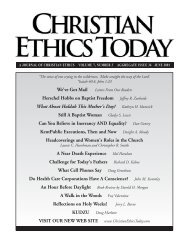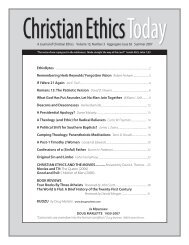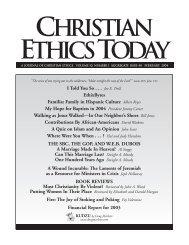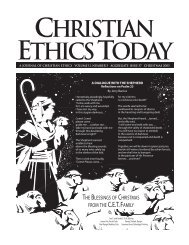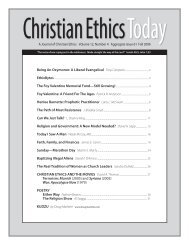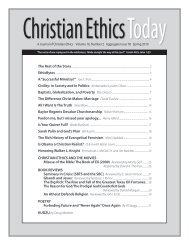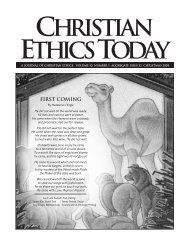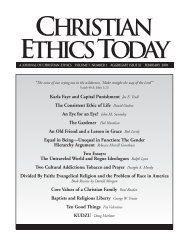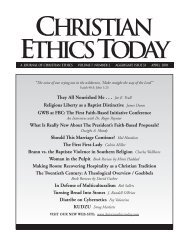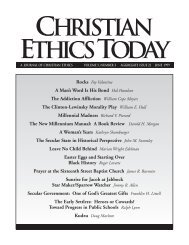Red-Letter Christians, An Emerging Evangelical Center, And Public ...
Red-Letter Christians, An Emerging Evangelical Center, And Public ...
Red-Letter Christians, An Emerging Evangelical Center, And Public ...
You also want an ePaper? Increase the reach of your titles
YUMPU automatically turns print PDFs into web optimized ePapers that Google loves.
Religious Liberty, Cultural Dialogue, and Creative Minorities<br />
By Coleman Fannin, PhD Candidate, <br />
Note: This essay was originally prepared<br />
for the 2007 fall conference of<br />
the <strong>Center</strong> for Ethics and Culture at<br />
the University of Notre Dame.<br />
Commentary on Benedict XVI’s<br />
2006 Regensburg address initially<br />
focused on his quotation of a 14th century<br />
Byzantine emperor in contrasting<br />
the role of reason in Christianity with<br />
that in Islam. However, as the question<br />
of whether the pope mischaracterized<br />
Islam has faded, it has become<br />
clear that his lecture marked not only<br />
another step in his argument with secular<br />
Europe but the beginning of a significant<br />
interfaith conversation. While<br />
Benedict critiqued forms of Islam that<br />
advocate conversion by force, he also<br />
lamented the separation of faith and<br />
reason among <strong>Christians</strong> and argued<br />
that only by bringing them together<br />
“in a new way” will we “become capable<br />
of that genuine dialogue of cultures<br />
and religions so urgently needed<br />
today.” He closed by inviting Muslims<br />
to become “partners” in such a dialogue.<br />
Among the numerous responses<br />
was an open letter signed by 138<br />
Muslim clerics and scholars that has,<br />
in turn, prompted a regular Catholic-<br />
Muslim Forum that will address two<br />
topics raised by Benedict: religious<br />
liberty and the separation of religious<br />
and political authority.<br />
Baptists can enthusiastically affirm<br />
this development. Our forbears’ recognition<br />
that a Christian culture maintained<br />
by coercion is, in the end, not<br />
Christian led them to stand, even suffer,<br />
for religious liberty. For example,<br />
John Leland and others pressed for<br />
the inclusion of the religion clauses<br />
in the First Amendment, and, on the<br />
whole, nonestablishment (rather than<br />
European disestablishment) was and<br />
is a welcome advancement. However,<br />
the burden of this essay is to show that<br />
Baptists and other <strong>Christians</strong> have yet<br />
to fully grasp its implications and, fur-<br />
<br />
ther, that this hinders our capability<br />
to engage in cultural dialogue.<br />
Baptistification and Baptist Identity<br />
There are inherent problems in<br />
employing “culture” as a parameter<br />
for dialogue. Cultural boundaries long<br />
taken for granted are rapidly destabilizing,<br />
if not disappearing, in the face<br />
of global commerce and migration,<br />
and the center of world Christianity<br />
is shifting south, undermining identification<br />
of the West with the church.<br />
Indeed, nostalgia for Western culture<br />
can obscure the influence of contemporary<br />
culture-makers, especially<br />
nation-states and the market(s) they<br />
shelter.<br />
Baptists face particular difficulties<br />
in negotiating our globalized world.<br />
Religious liberty arrived in the wake<br />
of Christendom and took root in the<br />
midst of a Protestant social consensus.<br />
No longer dissenters, we applied the<br />
democratic spirit of the early republic<br />
to our congregations. Yet the Civil<br />
War and industrialization ended<br />
Protestant cultural hegemony in the<br />
North and the fundamentalist-modernist<br />
controversy marked the beginning<br />
of the end in the South. Much<br />
of the conflict in the Southern Baptist<br />
Convention in the last century was a<br />
consequence of divergent reactions to<br />
this breakdown. The most prominent<br />
type of contemporary Baptists have<br />
enforced rigid doctrinal statements<br />
and aligned themselves with evangelicals<br />
(and, in some cases, Catholics) in<br />
order to resist secularization and pluralism.<br />
Few are interested in theocracy,<br />
but these Baptists do seek to retain or<br />
recover a preference for Christianity—<br />
a pursuit that has prompted a seemingly<br />
endless stream of commentary<br />
and rebuttal.<br />
Meanwhile, other Baptists have<br />
pledged allegiance to a secular government<br />
and a pluralistic culture, seeing<br />
in them vindication of “soul liberty”<br />
(or “soul competency”), a corollary<br />
of religious liberty. A classic formulation<br />
was given by Herschel Hobbs<br />
when he proclaimed that “religion is<br />
a personal matter between the individual<br />
and God” and that soul liberty<br />
“includes salvation by grace through<br />
faith without the need of a human<br />
mediator or any institution, ecclesiastical<br />
or political.” 1 When these<br />
Baptists engage public life, they typically<br />
attempt to translate biblical and<br />
theological admonitions into universal<br />
moral principles. Additional distinctions<br />
can be made, but the point<br />
is that both types of Baptists tend to<br />
conflate Christianity with America.<br />
Further, although their response has<br />
been regrettable and ineffective, the<br />
first type has better recognized the<br />
implications of the loss of cultural<br />
norms and the rise of individualism.<br />
Martin Marty was essentially correct<br />
in observing that American<br />
Christianity has been “baptistified.”<br />
He identified this phenomenon not as<br />
the growth of Baptist denominations<br />
but as the prevalence of an approach to<br />
faith that grounds religious identity in<br />
personal decision. 2 Again, the second<br />
type of Baptists see baptistification<br />
as vindication. For example, Walter<br />
Shurden argues that Marty accurately<br />
understood the Baptist “style” as permeated<br />
by a spirit of “FREEDOM,”<br />
while William Hull contends that baptistification<br />
occurred because Baptists<br />
were “uniquely suited by history and<br />
temperament to offer common people<br />
an understanding of the Christian<br />
faith that coincided with their quest<br />
for freedom in a new land of opportunity.”<br />
3 Hull and Shurden may be correct,<br />
but they and other such Baptists<br />
have failed to adequately consider<br />
how this land has changed, why a distinctly<br />
Baptist identity remains necessary,<br />
and whether there is a downside<br />
to grounding it in freedom. In short,<br />
does soul liberty—that is, volun-



